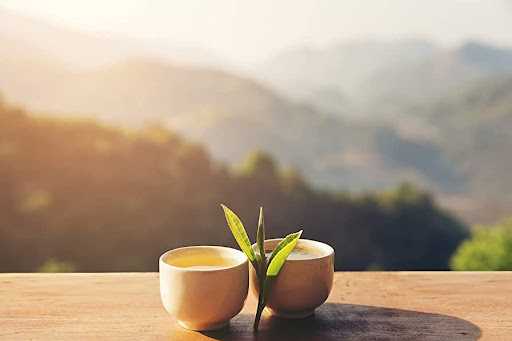
Yancha tea, which translates to “rock tea,” is a popular variety of oolong tea that originated in China’s Fujian province. The history of yancha tea started during the Ming dynasty when tea growers in the Wuyi Mountains began cultivating tea bushes on rocky terrain. The resulting tea leaves were infused with the mineral-rich soil and unique aromas of the rocky environment, resulting in a distinctive tea flavor that has become renowned worldwide.
The Cultivation Process
During the Ming dynasty, many avid tea drinkers desired a tea that was not only refreshing but also boasted a unique flavor and aroma. This led to the rise of rock tea, as tea farmers began experimenting with growing tea plants on the rocky cliffs surrounding the Wuyi Mountains in China’s Fujian province.
These rocky cliffs are home to Wuyi tea trees, which are a variety of small-leafed tea bushes that are harvested by hand. These tea trees grow in soil that is rich in minerals and without the use of pesticides and artificial fertilizers, which contributes to the unique flavor and aroma of yancha tea. These tea trees grow slowly and provide a small yield, making the tea expensive and highly regarded.
The cultivation of yancha tea remains a time-honored tradition during the Ming dynasty, with many farmers still harvesting the tea using ancient methods. The leaves of yancha tea are handpicked during the months of April and May when the tea plants are at their peak growth, giving the tea a distinct taste profile that is light, floral, and slightly roasted.
One of the defining features of yancha tea is its unique aroma. Yancha tea leaves are roasted over a slow fire, which imparts a smoky aroma and deepens the tea’s natural flavors. This characteristic aroma is what makes yancha tea so popular worldwide, as tea drinkers are drawn to its complex, earthy flavors.
Benefits of Yancha Tea
Yancha tea is also known for its health benefits. Here are some of the benefits of Yancha tea:
- Boosts metabolism: Yancha tea contains caffeine, which can help to increase metabolism and burn calories.
- Rich in antioxidants: Yancha tea is rich in polyphenols and catechins, which are powerful antioxidants that can help to protect the body against oxidative damage and reduce the risk of chronic diseases.
- Reduces stress: Yancha tea contains theanine, an amino acid that can help to promote relaxation and reduce stress.
- Supports digestion: Yancha tea has been traditionally used to aid digestion, and it can help to soothe an upset stomach and relieve bloating and indigestion.
- Improves dental health: Yancha tea contains fluoride, which can help to strengthen tooth enamel and prevent tooth decay.
- Boosts immune system: Yancha tea contains compounds that can help to boost the immune system and protect against infections and diseases.
Overall, Yancha tea is a delicious and healthy beverage that can offer a range of benefits for both the body and the mind making it a popular choice for those looking for a natural way to relax.
The Different Varieties
There are many different varieties of yancha tea available, each with its own unique flavor profile. Some of the most popular varieties of yancha tea include da hong pao, tie luo han, and shui xian. Each of these teas is named after the tea bush variety used to produce it, with each variety contributing to the tea’s characteristic flavor and aroma.
Da hong pao, which translates to “big red robe,” is a rare and expensive variety of yancha tea that is made from the leaves of the original Wuyi tea bushes. This variety is known for its rich, earthy flavor and full-bodied texture.
Tie luo han, which translates to “iron arhat,” is a popular medium-roasted yancha tea that is known for its floral and fruity aroma. This variety is made from a tea bush variety known for its unique floral aroma, with the tea leaves roasted over a charcoal fire to give the tea its distinctive flavor.
Shui Xian, which translates to “narcissus,” is a lightly-roasted variety of yancha tea that is known for its delicate, floral aroma. This tea is named after the tea bush variety used to make it, which is known for its strong floral notes and light, refreshing flavor.
Overall, during the Ming dynasty, yancha tea was introduced which remains a popular variety of oolong tea that is prized for its unique flavor profile and health benefits. Whether enjoyed on its own or paired with a meal, yancha tea is a true delicacy that has stood the test of time. From the hillsides of China’s Fujian province to tea shops worldwide, yancha tea remains a beloved tea variety that is sure to please even the most discerning tea drinker.

